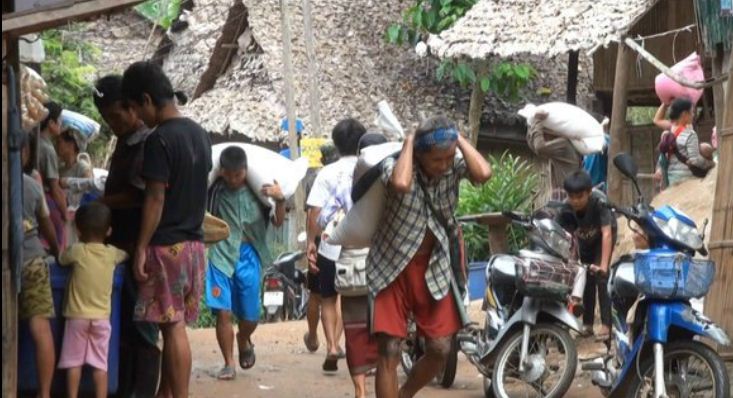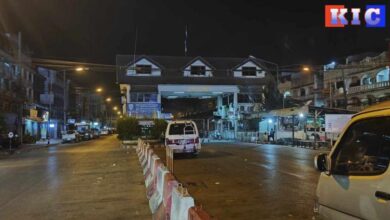Refugees Struggle With Rations Cut

Refugees on the Thai-Burma border struggle to find ways to cope with cuts to their food rations officially introduced to camps in December 2013.
Naw Htoo lives in Umpiem Mai Refugee camp south of the Thai Burma border town of Mae Sot. Naw Htoo said that the food ration cuts would mean her family would struggle for food.
“The rations is not enough for us – rice, cooking oil, charcoal, salt and fish paste.”
Naw Htoo’s family is large.
“We are ten and six have had their rations cut to eight kilos of rice. This is down from 12 kilo. The first month of the cuts we coped because we had reserves. For sure we will suffer next month.”
Naw Htoo’s said the cuts meant her family had to scavenge for food in nearby jungle areas.
“We have to find wood to cook with it when we don’t have enough charcoal. I don’t remember the last time we had meat. If we have meat we can only afford to buy the bones and dried fish. The last good meal we had was at church during Christmas.”
Naw Htoo said her husband had to risk leaving the camp to find work to help supplement the family’s food.
“My husband has to try to find work as a daily labourer. He risks being arrested.”
Naw Htoo said she has taken to growing vegetables around the house and foraging in the jungle
The 130,000 refugees on Thailand’s border with Burma are facing further food shortages, with the monthly rice ration for being slashed from 12 to eight kilograms. It is the latest cut to the ration, which previously stood at 15kgs in 2012.
The Border Consortium (TBC), a coalition of NGO’s that has administered aid to the camps for over two decades, said that the reduction in rations was due to a drop in funding from donors.
In an interview with The Irrawadddy, Mark Bruce, a spokesman for TBC, said eight kilograms was not enough. “We know this. The change in rations is not a good thing,” he said.
Mr Bruce added that the rice cuts did not apply to children, the elderly or the sick and that the rice ration for children under five years old has actually been raised to 13.5 kgs, although this was still lower than the 15kgs refugees were getting before the cuts started.
“In order to ensure that the community’s basic needs are met, TBC is continuing to maintain a standard monthly ration while introducing four staged levels of assistance,”
Under the staged assistance plan, households are categorized according to their level of need from, self-reliant, standard, and vulnerable to most vulnerable. TBC said that households that were self-reliant would see the cut in rice rations for adults.
Joint Secretary of the Karen Refugees Committee, said she supported the notion of encouraging self-sufficiency of refugees at the camp, but nevertheless expressed concern over the cuts. “This is a concern for us, we have to wait and see how this will effect people.”
Legal Pariahs
TBC said that they would increase job opportunities and vocational training as a way to increase refugee’s self-sufficiency, but some humanitarians believe this is unrealistic, as the majority of refugees are unregistered and lack the necessary documents to work outside the camps, thus leaving them with no legal protection.
And even if they can go home, conditions are more basic in Eastern Burma than they are in the camps.
According to household surveys in rural areas of South East Myanmar conducted by TBC in the past, just 27% of families’ access protected water sources. TBC’s surveys also indicated “59% of households are impoverished while a comparable proportion has recorded inadequate food security.”
In a 143 page report called ‘Ad Hoc and Inadequate: Thailand’s Treatment of Refugees and Asylum Seekers’, Human Rights Watch criticized Thailand’s refugee policies as causing refugees of all nationalities to be “exploited and unnecessarily detained and deported.”
“Thailand presents Burmese refugees with the unfair choice of stagnating for years in remote refugee camps or living and working outside the camps without protection from arrest and deportation,” said Bill Frelick, HRW’s Refugee Program director in a report last year focusing on the refugee situation in Thailand.
Thailand has not ratified the 1951 Refugee Convention and does not have a refugee law or functioning asylum procedures. It regards refugees living outside of official camps as being in the country illegally.
“While these camps offer some element of protection, by remaining in the camps without any source of real income, refugees become completely dependent on aid agencies.” Human Rights Watch said in the 2012 report.




